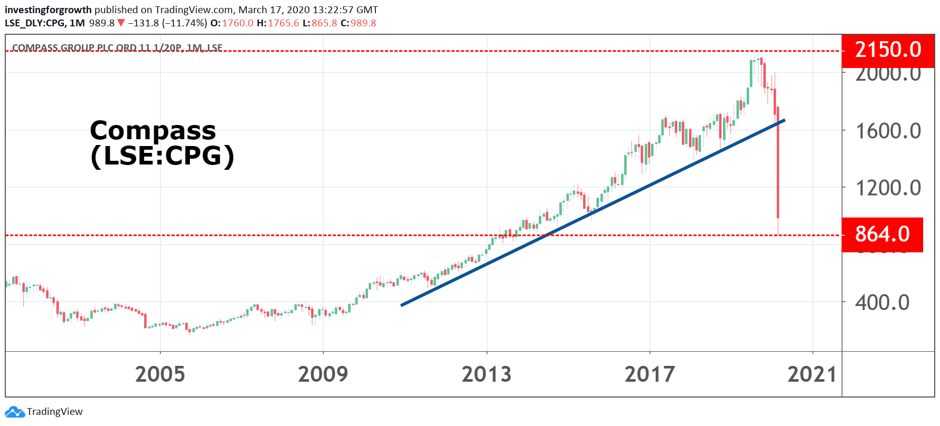These shares plunged after Boris warning
As the coronavirus reaction grows more draconian, we reveal the FTSE 100 stocks down 50% in a month.
17th March 2020 13:29
by Graeme Evans from interactive investor
As the coronavirus reaction grows more draconian, we reveal the FTSE 100 stocks down 50% in a month.

Britain's stay-at-home message for combating the spread of coronavirus was the trigger for more aggressive downgrades affecting some of London's best-known stocks today.
With people being urged to work from home and keep away from pubs and clubs, shares in transport companies National Express (LSE:NEX) and FirstGroup (LSE:FGP) were among the hardest hit after tumbling by 27% and 18% respectively in the FTSE 250 index. They were joined by bar chain Mitchells & Butlers (LSE:MAB), which slumped 19%, and by JD Wetherspoon (LSE:JDW) after a 14% fall.
There was also no respite for stricken airline and travel stocks, which continue to be on the frontline of the sell-off after coronavirus panic grounded most flights and holiday plans. TUI (LSE:TUI), cruise ship company Carnival (LSE:CCL) and British Airways owner International Consolidated Airlines Group (LSE:IAG) have now lost about two-thirds of their value since February 20.
The top-10 list of fallers also features caterer Compass (LSE:CPG), which had been one of the best performing blue-chip stocks of the past decade but is down 55% over the past month.

Source: TradingView Past performance is not a guide to future performance
This includes today's fall of 18% to the lowest level since April 2014, after the world's biggest food services company updated the market on how the cancellation of so many sporting and industry events is impacting its first-half results.
Trading had held up well until recently, but from growth of 6% in the five months to February 29 Compass now anticipates a rise of between 0% and 2% by the end of March. Operating profits will be between £125 million and £225 million lower than expected.
While today's guidance says nothing about the second half of the financial year, Compass points out that it has significant headroom on lending covenants as well as substantial liquidity.
The hope for Compass and the rest of the market is that the global economy can start growing again in the second half of 2020. But, for the timebeing, with so much uncertainty over the spread of coronavirus and the social curbs needed to tackle the pandemic, it's hard for retail investors to get an understanding on what the market is pricing in.
The past few weeks have seen a derating of price/earnings (PE) multiples on a par with the 35% decline at the time of the financial crisis in 2008. Analysts at UBS also noted yesterday that the 12-month forward PE is now at 10.8x globally, compared to the long run average of 14.5x.
Although UBS thinks consensus earnings estimates are still too high, it adds that market sentiment indicators have moved to extremes with valuations now pricing in aggressive downgrades. This is reflected in the FTSE 100 index, where 13 stocks have fallen by 50% or more since February 20.
| Company | Ticker | Share price fall since 20 Feb 2020 (%) |
|---|---|---|
| TUI (LSE:TUI) | TUI | -68 |
| Carnival (LSE:CCL) | CCL | -66.3 |
| International Consolidated Airlines Group (LSE:IAG) | IAG | -62.1 |
| M&G (LSE:MNG) | MNG | -60.7 |
| easyJet (LSE:EZJ) | EZJ | -59.8 |
| JD Sports (LSE:JD.) | JD. | -58.4 |
| Barclays (LSE:BARC) | BARC | -53.9 |
| WPP (LSE:WPP) | WPP | -52.8 |
| Barratt Developments (LSE:BDEV) | BDEV | -52.5 |
| Smiths Group (LSE:SMIN) | SMIN | -52.4 |
| Prudential (LSE:PRU) | PRU | -51.4 |
| Whitbread (LSE:WTB) | WTB | -50.9 |
| ITV (LSE:ITV) | ITV | -50 |
| Centrica (LSE:CNA) | CNA | -50.2 |
| Taylor Wimpey (LSE:TW.) | TW. | -49.9 |
They include high-yielding housebuilders Taylor Wimpey (LSE:TW.) and Barratt Developments (LSE:BDEV), as well as Prudential (LSE:PRU) and Premier Inn owner Whitbread (LSE:WTB). Barclays (LSE:BARC) is also among them, although it is clearly in the sights of bargain hunting investors after being the second most-traded stock in the FTSE 100 index this morning.
The most traded was Lloyds Banking Group (LSE:LLOY), followed by Vodafone (LSE:VOD), BP (LSE:BP.) and HSBC Holdings (LSE:HSBA). Many more profit warnings are likely to come in the coming weeks, which is far from ideal when we're in ISA season and investors are looking to deploy their tax-free allowance.
Our own Lee Wild's 12 crisis tips for investors yesterday had some reassuring advice, including a reminder that investors can still utilise the allowance in cash and then sit and wait until they feel more confident in their investment strategy.
- Coronavirus crisis: An essential guide for all investors
- Eight practical things investors of all ages can do when stock markets fall
- Bear markets: What, why and how
It is unlikely that investors will pick the bottom of the market, so they will need to have a long enough investment timeframe to weather further short-term market declines. There will also be plenty of shocks along the way, particularly for income investors.
This was shown today by high-yielding discount retailer Shoe Zone (LSE:SHOE) decision to axe its 8p a share dividend less than two weeks after it was approved at the company's AGM.
Shoe Zone, which has more than 500 outlets, said the move would conserve cash and protect it from an expected period of challenging trading. The company's shares slid 29% to 72p, having been more than 200p last summer when it impressed the City with record full-year profits.
Furniture retailer ScS Group (LSE:SCS), meanwhile, bucked some of the retail gloom today when it said that trading had actually strengthened since its last update in late January, with like-for-like order intake up 3.3% in the past seven weeks.
Whilst CEO David Knight said the return to growth over the key winter sales period was encouraging, he warned that the past week had seen reduced footfall. Shares were less than 1% lower at 151.5p, having already fallen from 227p at the start of March.
These articles are provided for information purposes only. Occasionally, an opinion about whether to buy or sell a specific investment may be provided by third parties. The content is not intended to be a personal recommendation to buy or sell any financial instrument or product, or to adopt any investment strategy as it is not provided based on an assessment of your investing knowledge and experience, your financial situation or your investment objectives. The value of your investments, and the income derived from them, may go down as well as up. You may not get back all the money that you invest. The investments referred to in this article may not be suitable for all investors, and if in doubt, an investor should seek advice from a qualified investment adviser.
Full performance can be found on the company or index summary page on the interactive investor website. Simply click on the company's or index name highlighted in the article.